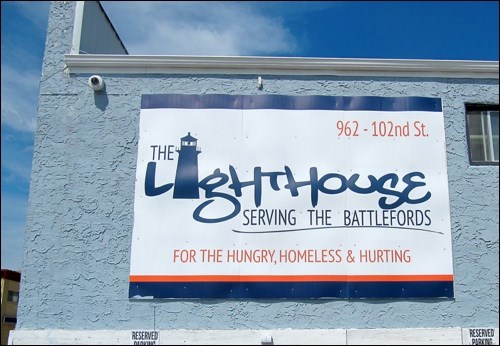Don Windels, executive director of the Lighthouse Supported Living for the last 18 years, says a change is needed in the way homeless shelters are funded.
The organization, based in Saskatoon, announced Friday The Lighthouse Serving the Battlefords emergency shelter program is expected to close as of April 1 due to lack of funding.
There needs to be core government funding made available so organizations such as The Lighthouse can “spend their time helping the homeless, instead of chasing money,” Windels told the News-Optimist in a telephone interview.
A release issued out of Saskatoon Friday stated, “It is with heavy hearts that The Lighthouse Supported Living delivers this announcement.
“Due to substantial funding changes, effective April 1, 2021 The Lighthouse Serving the Battlefords can no longer operate an emergency shelter program.
“The Lighthouse remains committed to the mission of ending chronic homelessness in the city of North Battleford, and will continue to explore emergency shelter funding sources and partnerships. Transitional and supported housing programs will continue to operate without disruption.”
Windels said closing the shelter was the only decision that could be made, as sources of funding run out at the end of March and, while there are conversations underway with potential funders, the staff in North Battleford had to be given four weeks’ notice by law. He hopes funding can be arranged, but he doesn’t know if it will or if it might be in time to continue the program.
Twenty-two part time and full time staff have been given their notices.
An average of 20 to 24 individuals have been making use of the centre each night, said Windels.
The shelter in North Battleford first opened its doors in 2015.
In 2014 The Lighthouse Supported Living Inc. had been approached by community leaders in North Battleford to open a permanent emergency shelter. The Lighthouse purchased the Reclaim Outreach Centre at 963-102nd Street in North Battleford. Renovations were completed and the doors opened in January 2015.
Windels said the Battlefords Agency Tribal Chiefs, which administers the Community Development Corporation that distributes casino funds, were instrumental in the opening of the shelter and it is their funding that has been the main source relied upon. But with the pandemic, and casinos affected by COVID-19 restrictions, that funding has been impacted.
Windels said they have been talking with BTAC, and maybe they will find some way to continue the shelter program, and The Lighthouse Supported Living is open to helping in any way they can. But whatever happens, he said, The Lighthouse is grateful to the organization for having made the shelter possible over the last several years.
In fact, Windels said they are grateful to the entire community that has been so supportive and they are sorry they have to reduce their activities in North Battleford right now.
The Lighthouse has also had a partnership with Battle River Treaty 6 Health to administer a Managed Alcohol Program, which he says has been successful, and which uses the shelter for long term housing of the clients. This funding may also be lost, he said, but there are other locations that can be used if they are able to continue the program. It has had a positive impact, said Windels, and he said is it gratifying to see some of the success they’ve seen with it in Saskatoon being replicated in the Battlefords and he hopes it can continue.
The difficulties being faced right now boil down to a lack of core funding, said Windels. They get so little from the provincial government right now as to have had no effect on the decision to close the shelter.
One major source of funding they had counted on in the past was reallocated, said Windels, as Reaching Home funding from Provincial Metis Housing Corporation was earmarked just for the north this time around, said Windels.
"We need to change the way shelters are funded,” he said.
North Battleford, is in a unique situation because of a jurisdictional argument. Many of the homeless are indigenous and as such, the provincial government says it’s up to the federal government to help, but the federal government says it’s up to the province because they are off-reserve, said Windels.
Having core funding in place would make working to help the homeless more effective and more successful, instead of spending so much energy on finding funding.
So much more could be done, he said.
This story has been updated to clarify funding from Reaching Home comes from the Provincial Metis Housing Corporation, rather than a federal program.


.png;w=120;h=80;mode=crop)

